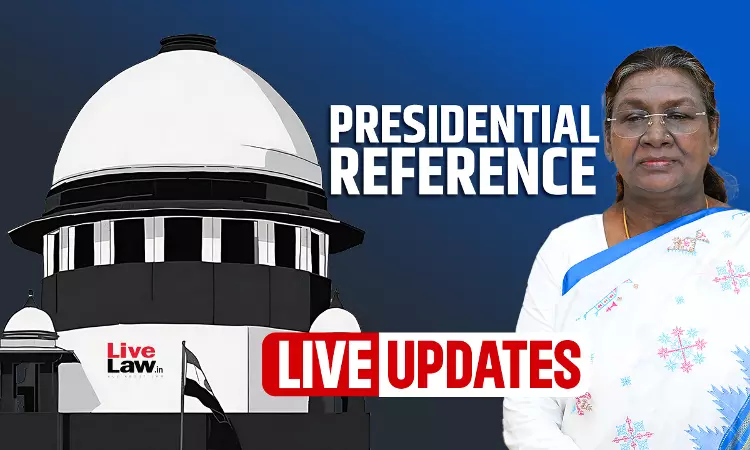Supreme Court Hearing-Presidential Reference On Timelines For Bills' Assent-DAY-3 : Live Updates
LIVELAW NEWS NETWORK
21 Aug 2025 10:26 AM IST

Live Updates
- 21 Aug 2025 2:50 PM IST
SG: Governor exercises several powers but some are core functions in the nature of legislative powers. Suppose, SC decides 100 cases per month and several cases are changed in curative decision and even after that, some feel they have not justice. But buck will have to stop somehere.
- 21 Aug 2025 2:48 PM IST
SG: Article 356 is executive power. Yours is a concern, but this forum is not a solution. Solution is constitutional amendment but for now, the political process. Every State does not take the confrontational position...your lordships are not flooded with States asking to examine their matters.
- 21 Aug 2025 2:46 PM IST
SG: I am not saying immunity. In Bihar case, mylords held Governor was acting mala fide
J Narasimha: substitute it with judicial review
SG: I am saying justiciability
J Narasimha: put it justiciability then, you say only way to answer it is through political process?
CJI: powers under Article 356 are for temporary period and there are in built safeguards that it has to be placed before both House etc. In 200, if we hold Governor has complete power to hold for immemorial, what is the safeguard for duly elected?
- 21 Aug 2025 2:43 PM IST
SG: in that case, if Governor sits, the solution does not lie here. It lies in political spheres- these are all political decisions and they are solved in democratic manner. This organ has protected fundamental rights, you are custodian, but there are problems not solvable by judicial but by political democratic process. There are constitutional functionaries responsible and answerable at least every 5 years
CJI: hon'ble Governor is not answerable to anyone
SG: Governor is the most vulnerable office, he can be removed for any reason..if something happens in judiciary, the system takes care of in the administrative side.
J Narasimha: constitutional immunity is clearly worded in what decision, why withhold has taken place etc and all these stand on footing that there is constitutional immunity but we are referring to procedure prescribed, in regards to this, where is the immunity? Kesari hind, says there is no question of deciding the assent. the inquiry into the constitutional process of granting or not granting or referring, whether immunity applies never ending is the question.
- 21 Aug 2025 2:40 PM IST
CJI: that is micro-management of government function, that we can't...suppose a particular function is entrusted to governor, when this court has set aside the constitutional amendment which took away power of judicial review, with those judgments, can we say that however the highest constitutional functionaries may be, if it does not act, the court is powerless? Suppose an act passed by competent legislature, hon'ble governor sits over it, then?
SG: the court may not decide justiciabilty on extreme cases
- 21 Aug 2025 2:32 PM IST
SG: the decision are polycentric in nature, the very nature is such that the court may not have judicially manageable standard. If there is assent, based on what the Court will examine whether it was rightly or wrongly given
There is constitutional comity, respect by one organ to another. There is no hierarchy. There are checks and balance. Legislative enactment is subjected to judicial review. Any decision by executive all subject to judicial review. But constitutional plenary powers in the nature of legislative, justiciability should be denied. I am placing reliance on Indira Gandhi v Raj Narrain.
- 21 Aug 2025 2:27 PM IST
SG: There are some communication inter-se constitutional functionaries which are beyond the examination by court. Governor's communication with President can't be examined. Similarily, any powers under Article 200 and 201 is outside judicial review, or non-justiciable. I should not use the word judicial review.



